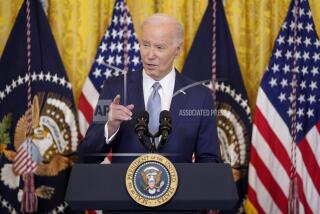California high court indicates it will deny law license to immigrant
SAN FRANCISCO — The California Supreme Court indicated Wednesday that federal law appeared to prevent immigrants without green cards from obtaining licenses to practice law.
During a hearing in a packed courtroom, several justices suggested they were bound to follow a law passed by Congress that denies professional licenses to immigrants who are in the country illegally.
The state high court is considering a bid by Sergio C. Garcia, 36, a Mexican immigrant who has spent most of his life in California, passed the state bar examination and has been waiting 18 years to obtain a green card.
Although the State Bar of California and Atty. Gen. Kamala D. Harris favored admitting Garcia, the court appeared to believe that Congress had tied its hands. Not one justice suggested that Garcia was likely to win his case.
Justice Marvin R. Baxter noted that the federal ban specifically allows state legislatures to override it and wondered aloud why California lawmakers had failed to act.
“I would think there is a lot of public support for this,” said Baxter, usually the court’s most conservative justice. “It seems to me a classic case where the political process could achieve a lot more than asking this court to legislate.”
Justice Goodwin Liu, probably the court’s most liberal justice, appeared to agree with Baxter that the court had little choice but to deny Garcia a law license.
Liu noted that the federal law prevented publicly funded entities from granting professional licenses to people residing in the country illegally, a ban he suggested only a state legislature could override.
“This court is an entity supported by appropriated funds,” Liu said.
Lawyers supporting Garcia argued the federal law did not apply to the California Supreme Court, which has the final say over state licenses for lawyers.
They also noted that the State Bar of California, which regulates the legal profession and recommends applicants to the court, is funded by member dues, not public funds.
Federal law has no effect on “this court’s long-established plenary power to license lawyers,” argued James Wagstaffe, representing the lawyers’ organization.
But Justice Joyce L. Kennard noted repeatedly that the federal government “has plenary authority over immigration issues.”
“The Legislature of California has taken no steps to override the federal statute,” she said.
Most organizations that have weighed in on the case support Garcia. But the Obama administration argued that a law license was a public benefit that Congress had restricted.
Garcia emigrated from Mexico with his family when he was 17 months old. He returned to Mexico when he was 9 and reentered the U.S. illegally when he was 17.
His father, an agricultural worker who has obtained U.S. citizenship, applied for a green card for his son in 1994. The federal government approved the application in 1995, but Garcia is still waiting for his green card.
He graduated from Durham High School in Butte County and Cal State Chico and earned his law degree from Cal Northern School of Law in Chico. He passed the bar on his first attempt, and state examiners found him morally fit to practice law.
The state bar sent Garcia’s application to the California Supreme Court for routine approval, but the court decided to review the case because of his immigration status. No other state high court has ruled on the issue. The California court is expected to decide Garcia’s fate within 90 days.
Garcia said he has been waiting four years for his law license, and if he doesn’t get it within another year, he will have to retake the bar examination. He makes a living as a motivational speaker and as an independent contractor.
Standing outside the court after arguments ended, Garcia conceded that he might have to turn to the California Legislature for help or even the U.S. Supreme Court.
“Whatever happens is not the end of it,” he said.
A spokesman for Senate President Pro Tem Darrell Steinberg (D-Sacramento) said legislation may be introduced if the court rules against Garcia. Steinberg would “certainly be supportive of a measure to allow someone like Mr. Garcia to obtain his license to practice law,” said Mark Hedlund, Steinberg’s communications director.
More to Read
Sign up for Essential California
The most important California stories and recommendations in your inbox every morning.
You may occasionally receive promotional content from the Los Angeles Times.











